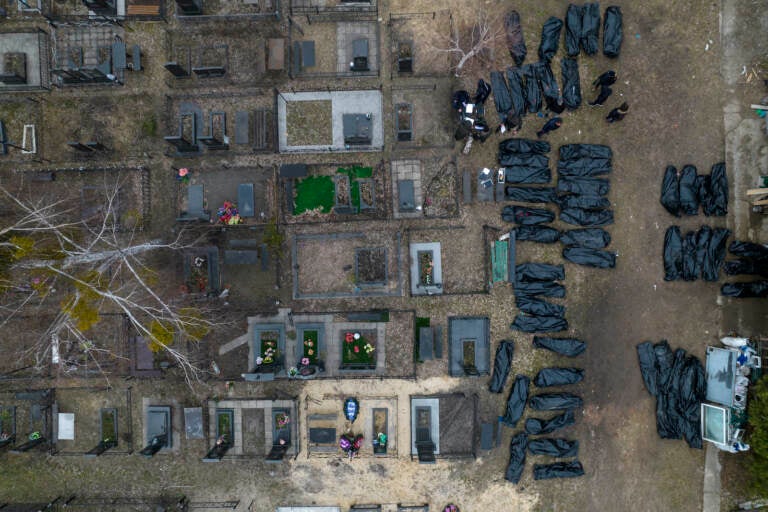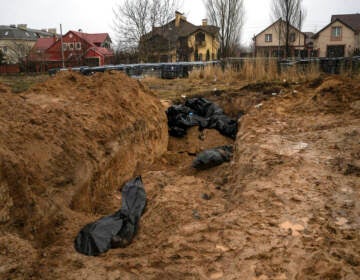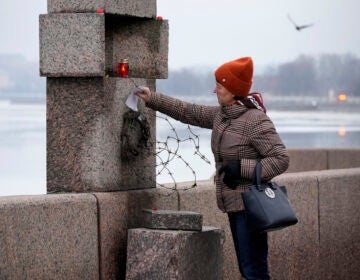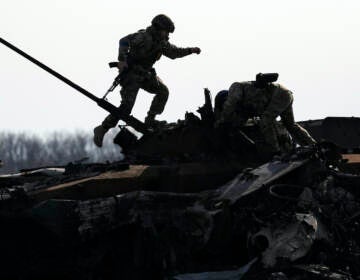Ukraine appeals for weapons as fight looms on eastern front
Ukrainian authorities are gathering evidence of alleged Russian atrocities amid signs Moscow’s troops killed people indiscriminately before retreating from Bucha.

Officials work to identify civilians who were killed during the Russian occupation of Bucha, Ukraine, on the outskirts of Kyiv, before sending the bodies to the morgue, Wednesday, April 6, 2022. (AP Photo/Rodrigo Abd)
Ukraine told residents of its industrial heartland to leave while they still can and urged Western nations to send “weapons, weapons, weapons” Thursday after Russian forces withdrew from the shattered outskirts of Kyiv to regroup for an offensive in the country’s east.
Russia’s six-week-old invasion failed to take Ukraine’s capital quickly and achieve what Western countries say was President Vladimir Putin’s initial aim of ousting the Ukrainian government. Russia’s focus is now on the Donbas, a mostly Russian-speaking region in eastern Ukraine.
In Brussels, Ukrainian Foreign Minister Dmytro Kuleba urged NATO to provide more weapons for his war-torn country to help prevent further atrocities like those reported on Kyiv’s northern outskirts. Ukrainian authorities are working to identify hundreds of bodies they say were found in Bucha and other towns after Russian troops withdrew and to document what they say were war crimes.
“My agenda is very simple… it’s weapons, weapons and weapons,” Kuleba said as he arrived at NATO headquarters for talks with the military organization’s foreign ministers.
“The more weapons we get and the sooner they arrive in Ukraine, the more human lives will be saved,” he said.
Some NATO nations worry they may be Russia’s next target, but the alliance is striving to avoid actions that might pull any of its 30 members directly into the war. Still, NATO Secretary-General Jens Stoltenberg urged member nations to send Ukraine more weapons, and not just defensive arms.
“Ukraine is fighting a defensive war, so this distinction between offensive and defensive weapons doesn’t actually have any real meaning,” he said.
Western countries have provided Ukraine with portable anti-tank and anti-aircraft weapons, but they have been reluctant to supply aircraft, tanks or any equipment that Ukrainian troops would have to be trained to use.
Asked what more his country was seeking, Kuleba listed planes, land-based missiles, armored vehicles and air defense systems.
Since Moscow announced more than a week ago that it planned to concentrate its forces in the east, growing numbers of Putin’s troops, along with mercenaries, have been reported moving into the Donbas, where Russia-backed separatists have fought Ukrainian forces for eight years and control two areas.
Ahead of its Feb. 24 invasion, Moscow recognized the Luhansk and Donetsk areas as independent states. Military analysts have said Putin also could be seeking to expand into government-controlled territory.
Ukrainian Deputy Prime Minister Iryna Vereshchuk urged civilians to evacuate to safer regions before it was too late.
“Later, people will come under fire, and we won’t be able to do anything to help them,” Vereshchuk said.
She said Ukraine and Russian officials agreed to establish 10 civilian evacuation routes from Donetsk, Luhansk and the Zaporizhzhia region. She said residents would be able to seek safety in the cities of Zaporizhzhia in southeast Ukraine and Bakhmut in the east.
Britain’s defense ministry said Thursday that Russia was targeting the “line of control” between Ukrainian-held and rebel-controlled areas in the Donbas with artillery and airstrikes and hitting infrastructure targets around Ukraine to wear down the Ukrainian defense.
Donetsk Gov. Pavlo Kyrylenko said at least five civilians were killed and another eight were wounded by Russian shelling on Wednesday.
Russia’s Defense Ministry said it struck fuel storage sites around the cities of Mykolaiv, Zaporozhe, Kharkiv and Chuguev overnight using cruise missiles fired from ships in the Black Sea.
A Ukrainian naval vessel caught fire under unclear circumstances in the besieged port city of Mariupol, satellite photos analyzed Thursday by The Associated Press show. The images from Planet Labs PBC appear to show the Ukrainian command ship Donbas burning at the Sea of Azov port on Wednesday afternoon as a nearby building also burned.
A cause for the fire remained unclear. Russian forces are fighting to capture Mariupol, which would allow Russia to secure a continuous land corridor to the Crimean Peninsula, which Moscow seized from Ukraine in 2014.
Ukrainian forces in the city also could be trying to scuttle the vessel so it doesn’t fall into Russian hands. Russian-backed separatists in eastern Ukraine had accused Ukrainian forces of setting fire to the vessel as a “provocation” to “discredit the Russian military.”
Mariupol Mayor Vadym Boichenko said more than 5,000 civilians have been killed during weeks of Russian bombardment and street fighting, including 210 children. The attacks have cut off food, water, fuel and medicine. British defense officials said 160,000 people remained trapped in the city, which had a prewar population of 430,000.
While a tentative state of calm returned to the capital following the Russian withdrawal, the possibility of a renewed attack around Kyiv and an escalation in western Ukraine remains. Air raid sirens were again heard Thursday in Lyiv and the relatively secure western city of Lviv, near the Polish border. There was no immediate report of any strikes hitting the cities.
Oleksandr Shputun, spokesman for the General Staff of the Ukrainian Armed Forces, reported Thursday that Ukraine’s second-largest city, Kharkiv, remained blockaded near the Donbas. He said Russian forces also were carrying out “brutal measures” in the southern Kherson region, which they hold.
The International Criminal Court has opened an investigation into possible war crimes in Ukraine. In areas north of the capital, Ukrainian officials gathered evidence of Russian atrocities amid signs Moscow’s troops killed people indiscriminately before retreating.
Ukrainian authorities said the bodies of least 410 civilians were found in towns around Kyiv, victims of what Ukrainian President Volodymyr Zelenskyy has portrayed as a Russian campaign of murder, rape, dismemberment and torture. Some victims had apparently been shot at close range. Some were found with their hands bound.
Western officials warned that similar atrocities were likely to have taken place in other areas occupied by Russian troops. Zelenskyy accused Russian forces of trying to cover up war crimes in areas still under their control, “afraid that the global anger over what was seen in Bucha would be repeated.”
“We have information that the Russian troops have changed tactics and are trying to remove the dead people, the dead Ukrainians, from the streets and cellars of territory they occupied,” he said in a nighttime video address. “This is only an attempt to hide the evidence and nothing more.”
Switching from speaking Ukrainian to Russian, Zelenskyy urged ordinary Russians “to somehow confront the Russian repressive machine” instead of being “equated with the Nazis for the rest of your life.”
The Kremlin insists its troops have committed no war crimes and alleged the images of brutality coming out of Bucha were staged by the Ukrainians.
Bodies were still being collected in the town. Cemetery workers on Wednesday began loading more than 60 bodies into a grocery shipping truck so they could be taken to a facility for further investigation.
Police said they found at least 20 bodies in the Makariv area west of Kyiv. In the village of Andriivka, residents said the Russians arrived in early March, took locals’ phones and detained and then released some people. Others met unknown fates. Some described sheltering for weeks in cellars normally used for storing vegetables.
“First we were scared, now we are hysterical,” resident Valentyna Klymenko, 64, said. She said she, her husband and two neighbors weathered the siege by sleeping on stacks of potatoes covered with a mattress and blankets. “We didn’t cry at first. Now we are crying.”
In reaction to the alleged atrocities, the U.S. announced sanctions against Putin’s two adult daughters and said it is toughening penalties against Russian banks. Britain banned investment in Russia and pledged to end its dependence on Russian coal and oil by the end of the year.
The U.S. Senate planned to take up legislation Thursday to end normal trade relations with Russia, paving the way for higher tariffs on some imports, and to codify President Joe Biden’s executive action banning imports of Russian oil.
The European Union is also expected to take additional punitive measures, including an embargo on Russian coal.
Zelenskyy said the sanctions would not be effective unless they included a ban on Russian oil, on which Europe relies heavily. He said the West’s sanctions on Russia so far “can’t be called commensurate to the evil the world saw in Bucha” and elsewhere.
___
Oleksandr Stashevskyi and Cara Anna in Bucha, Ukraine, Yuras Karmanau in Lviv, Ukraine, and Associated Press journalists around the world contributed to this report.
WHYY is your source for fact-based, in-depth journalism and information. As a nonprofit organization, we rely on financial support from readers like you. Please give today.







